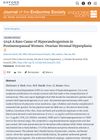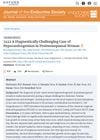 1 citations,
September 2023 in “JCEM case reports”
1 citations,
September 2023 in “JCEM case reports” GnRH analogues are effective for diagnosing and treating female androgen excess, offering a non-surgical option.
 April 2020 in “Journal of the Endocrine Society”
April 2020 in “Journal of the Endocrine Society” A woman's high testosterone and related symptoms were caused by overactive cells in her ovaries.
 27 citations,
April 2017 in “European journal of endocrinology”
27 citations,
April 2017 in “European journal of endocrinology” The research found that MRI and certain hormone levels can help tell apart ovarian tumors from hyperthecosis in postmenopausal women, but tissue analysis is still needed for a definite diagnosis.
 9 citations,
January 2007 in “Endocrine Practice”
9 citations,
January 2007 in “Endocrine Practice” A woman's male-like symptoms and high testosterone were due to ovarian hilus-cell hyperplasia, which improved after surgery.
 9 citations,
November 2013 in “Presse Medicale”
9 citations,
November 2013 in “Presse Medicale” The document concludes that managing female hyperandrogenism requires a combination of identifying the cause, lifestyle changes, medication, and cosmetic treatments.
 November 2022 in “Scientific Reports”
November 2022 in “Scientific Reports” Certain ESR1 gene variations may affect hormone levels and fat distribution in women with high male hormone levels.
 January 2020 in “International Journal of Research”
January 2020 in “International Journal of Research” High testosterone increases heart disease risk in women with PCOS.
 56 citations,
October 2018 in “Journal of The American Academy of Dermatology”
56 citations,
October 2018 in “Journal of The American Academy of Dermatology” Androgens play a complex role in skin conditions like acne and hair loss in women, and normal blood levels don't always show true androgen status.
 26 citations,
January 2013 in “BioMed Research International”
26 citations,
January 2013 in “BioMed Research International” Hormonal changes after childbirth and menopause can lead to women's hair loss and facial hair growth, with a need for better treatments.
 September 2023 in “Reproductive health of woman”
September 2023 in “Reproductive health of woman” PCOS is common, affects fertility, and requires personalized treatment to manage symptoms and health risks.
 April 2024 in “International journal of women's health”
April 2024 in “International journal of women's health” Adult female acne is a complex condition that can worsen with menopause, requiring holistic treatment and tailored skincare at different life stages.
 1 citations,
December 2022 in “Biomedicines”
1 citations,
December 2022 in “Biomedicines” Middle-aged women with PCOS often continue to experience symptoms related to high androgen levels, like unwanted hair growth.
 14 citations,
October 2019 in “International Journal of Women's Health”
14 citations,
October 2019 in “International Journal of Women's Health” Menopausal acne is treated with medications and lifestyle changes, but careful choice is needed due to side effects.
 31 citations,
May 2012 in “European Journal of Dermatology”
31 citations,
May 2012 in “European Journal of Dermatology” Menopause affects hair and skin; more research needed for treatment.
 1 citations,
January 2017 in “Tohoku journal of experimental medicine”
1 citations,
January 2017 in “Tohoku journal of experimental medicine” A woman's mature cystic teratoma caused her virilization by producing testosterone.
 July 2022 in “L Endocrinologo”
July 2022 in “L Endocrinologo” A 77-year-old woman with hair loss had high testosterone and 17OH-progesterone levels, but no significant findings on imaging.
 1 citations,
September 2020 in “Endocrinology, Diabetes & Metabolism Case Reports”
1 citations,
September 2020 in “Endocrinology, Diabetes & Metabolism Case Reports” The conclusion is that thorough investigation of hypertension and hormonal dysfunctions is important, and there may be a link between these conditions and cancer.
 January 2024 in “Journal of Education, Health and Sport”
January 2024 in “Journal of Education, Health and Sport” Platelet-rich plasma therapy shows promise in treating hair loss caused by androgenic alopecia.
 October 2023 in “The Journal of clinical endocrinology and metabolism/Journal of clinical endocrinology & metabolism”
October 2023 in “The Journal of clinical endocrinology and metabolism/Journal of clinical endocrinology & metabolism” Hyperandrogenism increases heart disease risk in premenopausal women, but this risk is linked to obesity in postmenopausal women.
November 2014 in “PharmaTutor” Finasteride may help postmenopausal women with hair loss but is not effective for all and should be used cautiously in premenopausal women.
 1514 citations,
December 2011 in “Fertility and sterility”
1514 citations,
December 2011 in “Fertility and sterility” Experts agree that PCOS affects women's health in complex ways, but more research is needed to understand and treat it effectively.
 October 2012 in “Sri Lanka Journal of Diabetes Endocrinology and Metabolism”
October 2012 in “Sri Lanka Journal of Diabetes Endocrinology and Metabolism” A rare ovarian tumor caused hair loss in a post-menopausal woman, which almost completely stopped after surgery.
3 citations,
January 2017 in “Gynecological endocrinology” A postmenopausal woman's excess male hormone symptoms were caused by a rare adrenal gland tissue in her ovary.
 17 citations,
May 2012 in “Clinical Endocrinology”
17 citations,
May 2012 in “Clinical Endocrinology” Surgery to lower high testosterone in postmenopausal women with certain ovarian tumors doesn't significantly affect their metabolism.
 October 2024 in “Journal of the Endocrine Society”
October 2024 in “Journal of the Endocrine Society” Ovarian stromal hyperplasia can cause high testosterone in postmenopausal women and is treated by removing the ovaries.
 October 2024 in “Journal of the Endocrine Society”
October 2024 in “Journal of the Endocrine Society” Surgical removal of a rare ovarian tumor improved symptoms and hormone levels in a postmenopausal woman.
 October 2024 in “Journal of the Endocrine Society”
October 2024 in “Journal of the Endocrine Society” The case highlights the complexity of diagnosing high testosterone in older women and the need for thorough testing.
84 citations,
September 2014 in “European journal of endocrinology” Doctors should check for serious tumor causes of high androgen levels in postmenopausal women and more research is needed on this condition.
 1 citations,
January 2008 in “Actas Dermo-Sifiliográficas”
1 citations,
January 2008 in “Actas Dermo-Sifiliográficas” Treat hair loss in postmenopausal women with diet, avoiding certain drugs, and using medications like minoxidil or finasteride.


























